SUMMARY
On October 31, 2021, in the single-mandate constituencies No.184 (Kherson region) and No.197 (Cherkasy region), voting took place in the by-elections of people's deputies of Ukraine, while in Kharkiv, citizens elected a mayor in the early elections.
OPORA provided non-partisan monitoring of the voting process and counting of its results at a statistically justified number of polling stations, assessing the quality of election procedures. Prior to election day, the organization's observers monitored the legality of all stages of the election process and their compliance with democratic election standards. At the time of publication of the preliminary statement, the organization's representatives continue to monitor the process of accepting PEC documents at meetings of Kharkiv TECs and in district election commissions in Kherson and Cherkasy oblasts.
The key preliminary conclusions of OPORA's observation of the election process:
- The by-elections of the People's Deputies and the early elections of the Kharkiv Mayor took place in a competitive environment but were accompanied by serious violations of the requirements of Ukrainian law and international standards for democratic elections.
- The key challenges for campaigning were the misuse of administrative resources in the interests of voters, the technology of material incentives for voters, the non-transparency of election finances, and having competitors use the practice of registering twin candidates against active participants in the election process.
- The by-elections of people's deputies of Ukraine and the early elections of the Kharkiv mayor were characterized by significant number of cases misusing administrative resources, which directly affected the principle of equal rights and opportunities of candidates. Candidates from various political forces, pro-government and opposition, tried to use their connections in government at various levels, to use the distribution of state subventions, local funds and development programs to attract the attention of voters. However, despite the fact that this practice is common for various political forces, it was most characteristic of the campaign of candidates from the "Servant of the People" party in constituency No.184 and No.197, Vitaly Voytsekhivskyi and Serhiy Kozyr, as well as of a candidate for mayor of Kharkiv, Ihor Terekhov.
- The election campaign in Kharkiv was accompanied by large-scale abuses of budgetary administrative resources in the interests of one candidate and the actual combining of his campaigning with official activities. The by-elections of people's deputies of Ukraine in the two constituencies involved the engagement of central-level officials into activities to de facto support candidates from the "Servant of the People" party, as well as the use of high-profile state programs (in particular, the “Big Construction” program) for campaigning purposes. Given the scale of the problem and its negative impact on the competitiveness of the electoral process, OPORA draws the parliament's attention to the need for additional regulation of government activities in the electoral process, including the activity of persons holding political office.
- Improvements in legislation have helped reduce the intensity of previously widespread voter bribery, in particular through the distribution of products and other goods. However, unfortunately, the electoral charity of the so-called third parties who were formally independent of the candidates but acted in their interests, remained a serious problem. First of all, we are talking about charitable foundations, which in some communities (for example, in constituency No.184 – the charity fund "We are here to live", associated with the candidate Hennadiy Lahuta) significantly influenced the course of the campaign. OPORA calls on the parliament, as part of the work already under way to amend the Electoral Code, to pay special attention to combating violations of the law and election standards by charities and other organizations affiliated with candidates.
- The election campaign for the by-elections of people's deputies of Ukraine was accompanied by high-profile reports about the possible implementation of voter bribery technologies, in particular under the guise of networks of campaigners and supporters. These reports became especially acute on election day in constituency No.197 of Cherkasy oblast, where OPORA observers found a number of cases showing elements of controlling the arrival of voters to polling stations, exercised by persons who relied on the lists of citizens with their personal data. Given these circumstances, OPORA requires law enforcement agencies to take immediate action to investigate reports of possible bribery and the possible related control over the citizens voting.
- In the early elections of the Kharkiv mayor, in the by-elections of the People's Deputy in constituency No.197, OPORA observers found incidents with signs of organization of control over the ballot. These incidents could be related to the illegal influence on voters at their place of work, as well as the implementation of technologies of voter bribery. All identified facts, some of which may have significantly affected the election results, must be promptly investigated.
- Competitors used twin candidate technology to mislead voters and disperse votes from supporting popular candidates. The investigation of individual incidents initiated by the National Police of Ukraine is an important step towards ending this unfair practice. However, it is necessary to conduct a legal assessment of all cases and formulate a legislative solution at the parliamentary level (respecting the constitutional rights of citizens).
- Candidates in the by-elections of people's deputies of Ukraine tried to use formally independent public associations in their own electoral interests, negatively influencing the conditions of non-partisan observation. Voters often did not have the opportunity to distinguish the activities of non-party observers from politically motivated actions of organizations dependent on parties and candidates. Particularly critical were situations where formally non-partisan observation organizations were part of candidates' election technologies to work with voters and campaigners or to implement illegal technologies to influence citizens' expression of will. In particular, signs of such activity were recorded in constituency No.197 of Cherkasy region, as part of recorded incidents of control over the arrival of voters at the polling station. OPORA believes that at the level of law and political practices, it is necessary to take measures to enable non-partisan observation in Ukraine, which is an important guarantee of a democratic election process.
- Large-scale expenditures of unregistered candidates before the official start of the election process, the low discipline of election subjects in opening election fund accounts, and uncontrolled expenditures on social media demonstrate the importance of reforming the system of control over electoral and political finances.
- A serious problem of the final stage of the election process can be seen in the attempts of Kharkiv PEC members to restrict the organization's observers in controlling the process of vote count, and to carry out its photo and video recording. The intensity of such abuses against observers, combined with fairly widespread violations of the vote count at Kharkiv PECs, demonstrates the need for a detailed study of all circumstances and proper legal verification of voting results in the city.
- Conducting elections amidst the pandemic did not significantly affect the ability of voters and candidates to interact, but the disorganization of certain stages of election commissions, such as the acceptance of PEC documents by territorial and district commissions, did not adequately ensure compliance with anti-epidemic measures.
- Despite the unfavorable conditions for holding elections during the distribution of COVID-19, election commissions at all levels ensured the stable organization and conduct of voting. But, according to OPORA, the election process in the parliamentary constituencies and in Kharkiv once again demonstrated the need to strengthen the requirements for the professionalism of election commissions, to improve their staffing and equipment, and to enhance financial motivation of election commission members.
- Attempts by voters to obtain ballots illegally, and other violations, confirm the importance of intensifying awareness-raising campaigns by the government, and scaling up the previous experience of the CEC and other election commissions in this area.
The set of problems identified by OPORA testifies to the importance of maintaining electoral reform in the priorities of the Verkhovna Rada of Ukraine. Instead, law enforcement agencies should ensure the investigation of all identified incidents and promptly respond to possible violations of the law during the establishment of the returns and results of voting in the by-elections of MPs of Ukraine in constituency No.184 and No.197, and in by-elections of Kharkiv mayor.
STATISTICS OF TYPICAL VIOLATIONS ON VOTING DAY
Throughout the election day, on October 31, 2021, OPORA observers assessed the quality of compliance by the subjects of the election process with a set of election procedures during voting, on the basis of a statistically justified number of polling stations. OPORA's study aims to identify the most common violations in PEC activities, from preparatory meetings to the organization of the voting process and the vote count. This provides an evidence base that represents the overall picture of PEC voting, highlights the trends, and the scale of electoral fraud, rather than accumulates the randomly collected individual facts.
The maximum error of the survey for the elections in Kharkiv is 3.7%, in the by-elections of the People's Deputy in constituency No.184 (Kherson Oblast) – 5.10%, in constituency No.197 (Cherkasy Oblast) the survey covers all polling stations in the constituency. For cases where the error calculations differ from those given herein, the corresponding error value is indicated separately (in parentheses).
Extraordinary Elections of the Kharkiv Mayor
The stage of holding the preparatory meetings of the precinct election commissions took place in a peaceful atmosphere, but had a number of procedural shortcomings. At 21.46% of polling stations (error – 5.5%), commission members did not keep the minutes of the preparatory meeting. Compared to the 2015 local elections, the situation deteriorated significantly, as only 5.7% of PECs ignored this legal requirement at that time.
72.6% of PECs (error – 5.5%) started preparatory meetings within the timeframe provided by law, within 45 minutes before the start of voting. Instead, 24.66% of PECs started working between 07:00 am and 07:15 am, and 2.74% of PECs performed procedures before 07:00 am. Compared to the 2015 local elections in Kharkiv, the statistics deteriorated, since at that time, 81.6% of PECs complied with the law.
Attempts to obstruct the organization's observers' access to PEC preparatory meetings were recorded in 2.5% (error - 5.5%) of the city's polling stations. During such incidents, PEC members demanded from OPORA observers to follow the anti-epidemiological requirements, although they are not provided by the current election law. Following clarifications from OPORA and appeals to the TECs and the National Police, observers were able to begin their duties, albeit with some delay. In 2015, during the local elections, OPORA faced obstacles to the activities of observers in 3% of polling stations. According to observers, in 11% of polling stations in the city (error – 5.5%), voting started before 08:00 am, and in 0.5% of PECs, voters were given the opportunity to vote behind end time.
The most frequent violations on election day at polling stations in Kharkiv were the issuance of ballots without a passport, the demonstration by voters of the results of the expression of their will, and attempts by voters to take photographs of completed ballots. Abuse related to the illegal issuance of ballots was detected by observers in 8% of the city's polling stations. The same data was found about the number of polling stations where voters violated the secrecy of the ballot by showing the ballot out. Compared to the recent regular local elections, the scale of recorded cases of photographing ballot papers has slightly increased – violations occurred in 7% of PECs versus the 3.2% of polling stations in 2015. No attempts were found of ballot stuffing on election day.
OPORA observers assessed the queues of voters who were in the polling station at the time of closing and, in accordance with the law, they were still entitled to receive the ballots. There were no such queues in 100% of the polling stations covered by the observation.
The closing of polling stations and the counting process turned out to be the most problematic stage in the implementation of election procedures on election day in Kharkiv. According to OPORA observers, the legal counting procedure was not followed in 13.82% of constituencies (error – 4.6%). In 2015, such cases were recorded at 1.22% of PECs. Also, in 3.23% of polling stations, observers encountered obstacles to counting (in 2015, there were 1% of such PECs). The meeting started with delay in the same number of PECs. The presence or interference of outsiders with the work of the commissions at the final stage was not a major issue.
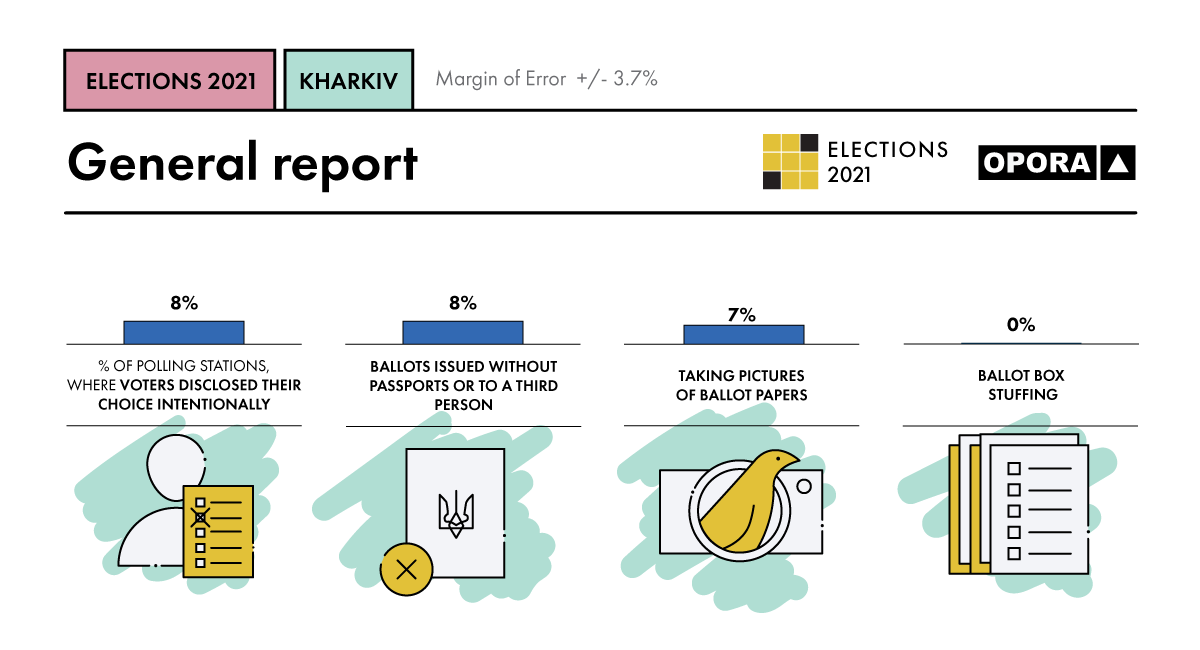
By-elections of People's Deputies of Ukraine in Constituencies No.184 and No.197
Compared to the elections in Kharkiv, precinct commissions in Kherson and Cherkasy oblasts provided better organization and holding of preparatory meetings. At 4.35% of PECs in constituency No.197 of Cherkasy Oblast and at 6.58% of PECs in constituency No.184 of Kherson Oblast (error – 9.6%), members of election commissions did not meet the requirements for keeping minutes at preparatory meetings. For the early elections of people's deputies in 2019, this figure was 5.7%, on a nationwide scale.
In the single-member constituency No.184 in Kherson oblast, 77.63% of PECs (error – 9.6%) started preparatory meetings within the timeframe provided by the Electoral Code. In constituency No.197 (Cherkasy region), 82.61% of PECs complied with the set legal requirements. Other commissions started preparatory meetings earlier, which did not allow interested subjects of the election process to monitor all procedures of preparation for the opening of polling stations. In the early elections of people's deputies of Ukraine in 2019, the situation was similar – 81.6% of PECs within the country adhered to the start of the preparatory sessions. 23.68% of PECs in constituency No.184 of Kherson Oblast (error – 9.6%) and 18.12% of PECs of constituency No.197 of Cherkasy Oblast opened for voters before 08:00 am, formally violating the start time of voting.
The problem of issuing ballots to voters who did not have proper IDs prevailed on election day at polling stations, in both Cherkasy and Kherson oblasts. In constituency No.184, observers reported such violations in 5.26% of polling stations. In constituency No.197, where most polling stations are located in rural areas, 12% of PECs recorded this type of violation. In the 2019 parliamentary elections, the share of PECs where observers witnessed the illegal issuance of ballots was 10%.
Approximately the same was the case in single-member majority constituencies with the cases of breaking the secrecy of the ballot through the demonstration of completed ballots by voters. Such actions were detected in 3.95% of polling stations in the Kherson region, and in 4% of PECs in constituency No.197. Photographs of completed ballots on election day were recorded in 3% of polling stations in Cherkasy oblast, and in 1.32% in constituency No.184. The lack of statistically significant indicators of violations related to attempts to cast ballots in bunches was also a common feature of the voting in the polling stations where the by-elections were held on October, 31.
The final stage of the election day in Cherkasy and Kherson regions (the closing of polling stations and the counting process) took place with no critical abuses of a regular or repeated nature. The procedure for vote count was not fully complied at 4.35% of PECs in constituency No.197, and in 3.95% of polling stations in constituency No.184 (here, the error is 4.4%). The final meetings in both constituencies began on time and all precinct election commissions worked in a plenipotentiary mode. Problems with the presence of outsiders at PEC meetings were limited in nature and were recorded in 1.32% of polling stations in constituency No.184 in Kherson region.
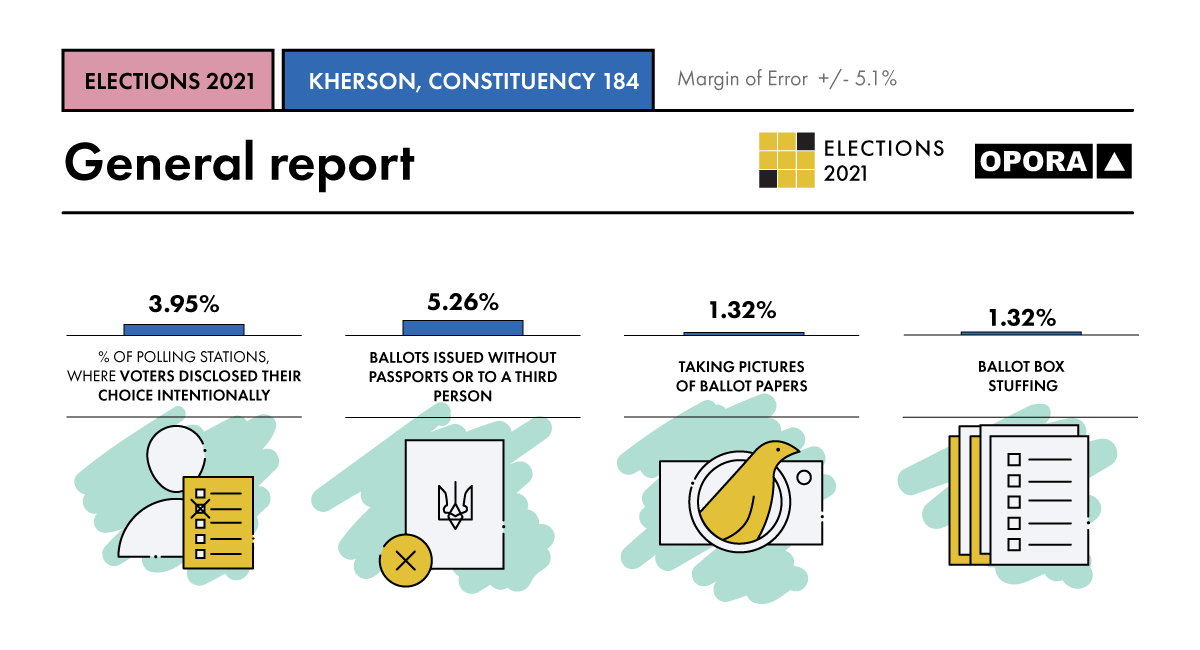
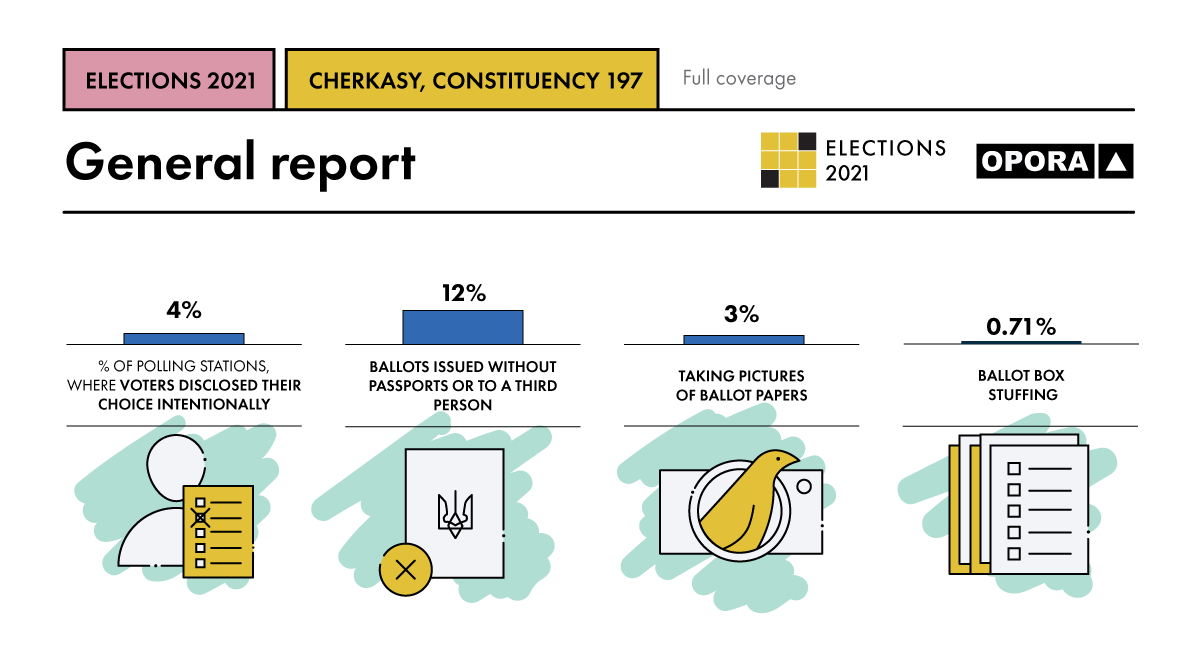
VERIFIED INCIDENTS AND VIOLATIONS OF ELECTORAL LAW
By-elections of the People's Deputy in Constituency No.184 (Kherson Oblast)
Since the start of PECs operations on election day, OPORA observers in the by-elections of people's deputies in constituency No.184 have identified and verified 50 violations of electoral law and democratic election standards.
Of these, 3 cases concerned voting without documents, in lieu of another person, other illegal voting, including the issuance of ballots without a passport, or on the basis of a photo of a passport – at 6 polling stations, based on an international passport or the "Diia" application. In another case in polling station No.650299, a voter threw two ballots into the ballot box.
In two cases, voting outside the voting booth was recorded (PS No.631118, PS No.631496). In addition, observers reported that ballots were photographed at PS No.650299, and there were 4 incidents involving outsiders, including a media representative and unauthorized observers, as well as an MP Andriy Klochko (PS No.710187).
Problems with ensuring the equipment and materials in polling stations (more than 10 cases) are common. In particular, it manifested itself in an insufficient number of booths, ballot boxes or non-compliance with other requirements for the technical staffing of the election commission.
PECs also committed procedural violations, in particular when ballots were issued by one PEC member (5 incidents); two PEC members provided voting at the place of stay (in 2 cases); the seal was not stored in the safe box (1 incident); the secretary entered data into the vote count protocol in pencil (PS No.650594); in the vote count protocol they mistakenly stated the number of ballots that are not subject to counting instead of the number of unused ballots (PS No.650411). There were also cases when the total number of ballots was counted by several people at the same time (PS No.650299), which undermines the credibility of the counting results. It should also be noted that in PS No.650602, the DEC replaced two PEC members, including the PEC secretary, who took an oath during the voting without waiting for the evening session, which may lead to an appeal against the results of voting at this polling station.
A total of 8 violations were recorded at PECs during the vote counting and the completing of vote count protocols. Thus, observers reported facts of falsification of election documents when the vote count protocols were first signed and then filled in (PS No.650004). It should also be mentioned that, since the remuneration to the commissioners depends on the days worked, the practice of drawing up protocols of the “future” continues (PS No.650299, No.650303, No.650296). In some cases, commission members responded to the observer's remarks and corrected the time and date, noting that this was a mistake. Observers also warned of violations of the order of counting votes (PS No.650299) and filling in the protocols in a pencil (PS No.650594).
By-elections of the People's Deputy in Constituency No.197 (Cherkasy Oblast)
From the start of PEC operations on election day to the end of voting, OPORA observers in constituency No.197 identified and verified 59 violations of electoral law and democratic election standards.
Of these, one case is related to the obstruction to recording the voting process in PS No.710894 (the ban on video recording during the counting was terminated only after the police were called).
Particular attention should be paid to individual incidents with signs of controlled voting (5 incidents). Thus, in PS No.710212, an unknown person approached the members of the commission with a list and asked if such people were there. In PS No.710194, a car was parked near the polling station where people sat and checked some lists. In PS No.710877, an observer noticed a voter taking a photo in the polling booth, and outside the polling station; unknown individuals were comparing people who had voted with certain lists. A similar situation occurred in PS No.710174. According to PEC members and observers, in all cases, these people represented a candidate Viktor Voytsekhivskyi. Instead, in PS No.710187, the observer recorded 4 people from the candidate Dmytro Kukharchuk, at the entrance to the polling station, who had name lists of voters and marked the people who came. Observers also recorded the presence of outsiders in 2 cases (PS No.710886 – a woman with a voter list, PS No.711069 – a woman in a police uniform walked around the polling station and asked members of the commission about the turnout), which may also show signs of controlled voting. Other grounds to conclude about the controlled voting can also come from the facts of photographing ballot papers, which was recorded in PS No.710888, PS No.631543, PS No.711072.
There were common facts of voting without documents, for another person, other illegal voting (8 cases in total), including the issuance of ballots without a passport, or based on a passport photocopy, at 6 polling stations, based on an international passport and the "Diia" application, as well as cases of voting outside the booth (PS No.710193, PS No.710218). In two cases, falsification of election documents was recorded (incorrect date of signing, etc.). In particular, in PS No.710202, the commission forced the observer to sign an act on the issuance of copies of protocols during the voting process (at 12-12: 30 pm), and in PS No.710882 the commission members began to fill in the protocol of the election commission before the completion of voting. At PS No.710189, one of the observers tried to rip the seal from the box (a ballot box at home), which provoked a fight.
Two cases of improper logistics of polling stations were identified, such as the insufficient number of ballot boxes. In two more cases, there was a lack of a separate voting booth for voters with signs of respiratory disease (PS No.710275), there were no distance markings or pointers for people with fever (PS No.710228). PS No.10710736 recorded the presence of a man and a woman in the same booth during the voting. In PS No.10710894, voters did not leave the polling station in time, immediately after dropping the ballots into the ballot boxes.
Observers also reported the facts of campaigning on election day (2 cases), in particular in PS No.711030, PS No.711031 at the entrance to the polling station set up a model of one of the candidates.
PECs also committed procedural violations, including the issuance of ballots by one PEC member (1 incident), the absence of minutes of the preparatory meeting (2 incidents at PS No.710228, PS No.710228), the compilation of a voter list for home-based voting during the morning preparatory meeting, casting checklists into ballot boxes without the seals.
At the polling station No.710187 the stay of the People’s Deputy, Andriy Klochko was recorded, and at the polling station No.710196 – the deputy of the district council was present.
During the vote count and drawing up of vote count protocols at the polling stations of constituency No.197, a total of 10 violations were recorded. There was an incident with the disappearing ink pen in PS No.710880. The observer checked this by making an inscription on the paper, which eventually disappeared. When counting the ballot papers that did not have any marks but there was an impress in the form of a tick or a plus sign, the commission account for them as valid. At PS No. 710882, the ballots were unlawfully declared incomprehensible due to the lack of a stamp on the checklist, without finding out whether there were any doubts about the authenticity of the signatures on such a list. Traditionally, it was recorded the drawing up of protocols with a future date (PS No.711036, PS No.710717, PS No.710697, PS No.710876, PS No.710216), or drawing up the vote count protocol on the draft version (PS No.710697).
Due to the small number of polling stations with the accepted documentation, only 3 violations were recorded at DEC 197 by 8 am, the meeting was also adjourned, and members of PS No.710177 arrived at DECs with a seal. The fact of the presence of the People’s Deputy Oleh Arsenyuk was recorded during the continuing meeting.
Extraordinary Elections of the Kharkiv Mayor
Since the start of PEC operations on election day, OPORA observers in the Kharkiv mayoral election have identified and verified 311 violations of election law and democratic election standards. Of these, 12 cases concerned threats to the safety of the observer or restrictions on observation. In particular, in PS No.631626, PEC members tried to remove the observer from the polling station, without any decision on deprivation of attendance. Another 8 incidents related to the objection to the recording of violations. In particular, observers were forbidden to take photos of violations (for example, in PS No.631596 the observer was prevented from photographing how a commission member corrected a voter’s mistake, when a voter signed under a wrong name; they explained that the persons lists had personal data of voters (their addresses). In PS No.631560, the PEC chairperson prohibited to take a video recording of the violation (a voter voting outside the voting booth).
As always, a significant part of violations is about the inadequate equipment of polling stations (21 in total), insufficient number of booths, ballot boxes or non-compliance with other requirements for election equipment. Of these violations, 2 should be singled out, which relate to anti-epidemic measures during the voting. Thus, in PS No.631683, there is one booth for people with disabilities and for those who have a fever, and in PS No.631632 there is no box or a separate booth for voters with signs of respiratory disease. Speaking of violations of quarantine restrictions, there were cases of voters in the polling station without a facemask, in particular in PS No.631118.
Incidents with signs of controlled voting (3 incidents) deserve special attention. Thus, in PS No.631164, the cadets came in a platoon with an assumed “supervisor” and tried to photograph the ballots. In PS No.631164, the cadets received instructions on who they should vote for. In PS No.631675, an observer prevented an attempt to take the ballot paper outside the polling station. Incidents involving voters taking pictures of their ballots (10) and displaying a completed ballot (16) were also quite common, which may also be a sign of controlled voting. This includes incidents involving voting for another person or without proper IDs (5), such as in PS No.631249, where a voter tried to vote based on a copy of a passport, but members of the commission did not allow him to do so. In PS No.631093, voters were allowed to vote by their last name after marriage, although such changes were not reflected in the voter list. A ballot paper without a passport was issued at PS No.710191. There were 12 cases of voting outside the booth, which may also be indicative of controlled voting.
Observers reported incidents of falsification of election documents. Thus, in PS No.631306, the protocol on vote count at the polling station was signed by the chairman and members of the commission before the end of voting, and in PS No.631339 during the signing of vote count protocols, the observer from another entity signed for two persons. It should also be mentioned that, since the remuneration of commission members depends on the days worked, the practice of drawing up protocols of the “future” is common (PS No. 650296, 631610, 631405, 631360, 631365, 631372, 631370, 631201, 631367).
Cases of illegal ballot stuffing were also recorded (in PS No.631272 the voter was in the voting booth for a long time, then quickly went out and threw a blank sheet of paper into the ballot box).
In addition, contrary to the requirements of the Electoral Code, in 27 cases there were outsiders in the PS premises, usually representatives of the Ministry of Emergencies, police, employees of institutions where the voting premises are located, cleaners, etc.
There was one incident with the ID card not being issued to the voter due to the lack of an appendix on the place of registration (PS No.631131) and one incident with the destruction of the ballot paper (in PS No.631657 the voter asked a commission member to read the candidate’s name on the ballot. After the refusal, he got angry, tore his ballot paper, and left).
PECs often committed procedural violations, including the issuance of ballots by one PEC member instead of two, as required by the Electoral Code (24 incidents): they did not keep minutes of the preparatory meetings (4 incidents), filled the protocols in pencil (PS No.631212, 631120), and included citizens to voter lists on election day (PS No.631640), or technical breaks were announced (PS No.631422, 631216). There were also cases when the total number of ballots was counted by several people at the same time, which undermines the credibility of the counting results. 8 cases concerned the refusal to provide copies of the vote count protocols.
Observers also repeatedly reported cases of campaigning on election day (15 cases). In particular at PS No.631212, 631212 voters voiced who they voted for, and voters came to PS with bags, packages and flyers from candidates. At PS No.631560, PS No.631683, voters brought election invitations from Terekhov (usually they are enclosed in a passport, but they were also shown to members of the election commission and other voters), and so on.
As of 8 am, 8 violations were recorded at TECs, 3 of which concerned TEC acceptance of documents with signs of unsealing (open security packs or torn packages with election documentation), 1 case of announcing a technical break, 1 arrival of PEC members at TECs with PEC seals, 3 violation of the decision-making procedure on the need to draw up protocols with the mark “updated”. Upon arrival at the Industrial City District TEC in Kharkiv of PEC members with a seal, observers called the police on the grounds of a criminal offense under Part 3 of Article 157-3 of the Criminal Code of Ukraine.
Voter Turnout on Election Day (according to the Civil Network OPORA)
On election day, October 31, 2021, the Civil Network OPORA counted voter turnout in Kharkiv, in Cherkasy Oblast (constituency No.197), and in Kherson Oblast (constituency No.184) based on a statistically representative sample of polling stations where official observers were present. The data was recorded as of 12:00, 16:00, and 20:00.
Turnout in the early elections of the Kharkiv mayor as of 20:00 was 28.6% (error – 1.1%). In the 2015 local elections, the turnout at the same time was 45.5%.
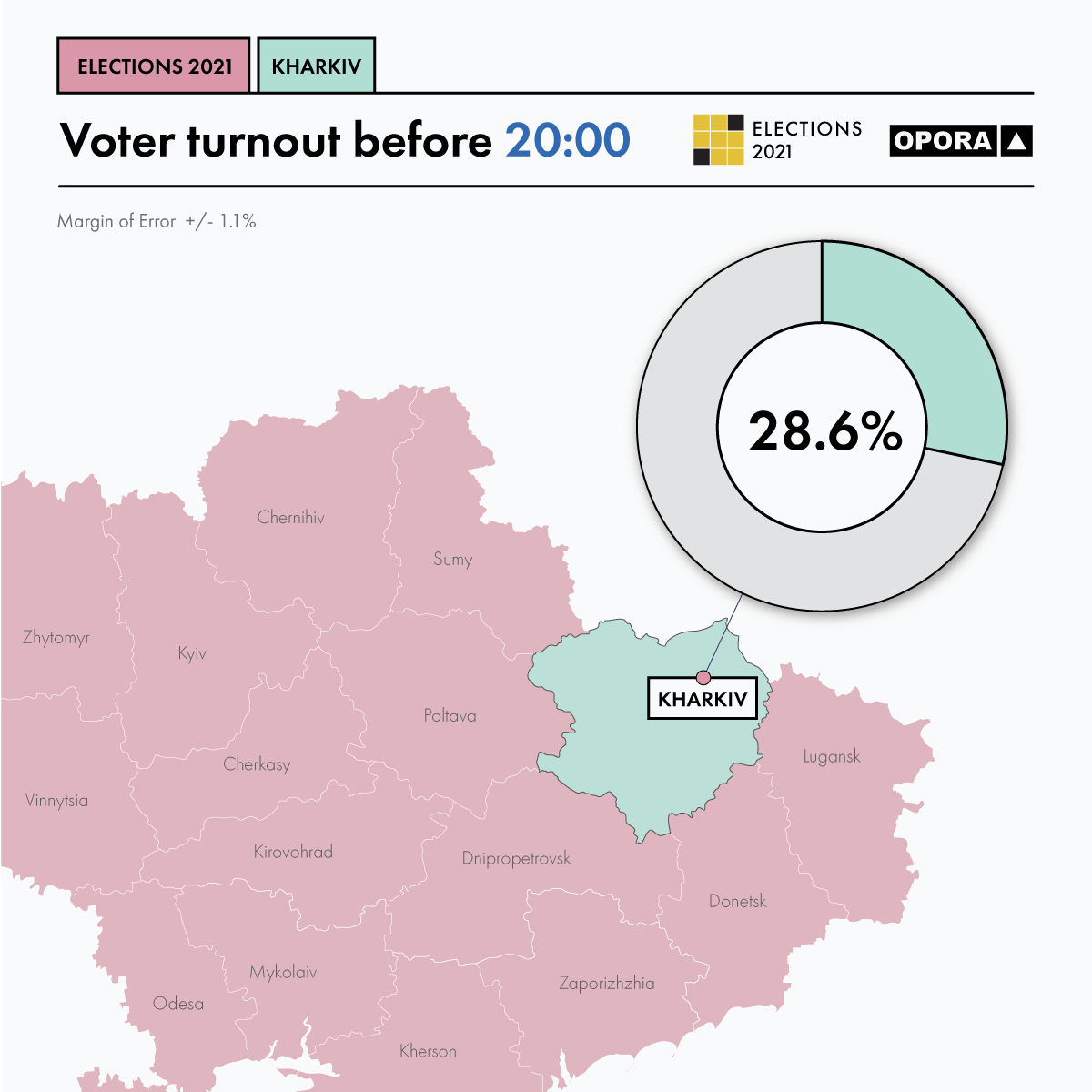
In the by-elections of the People’s Deputy in constituency No.184 (Kherson Oblast) as of 8 pm, voter turnout was 20.6% (error – 2.5%). To compare: in 2019 in this constituency voter turnout as of 20.00 was 46%.
In constituency No.197 (Cherkasy Oblast), the turnout in the by-elections of the people’s deputy as of 20.00 was appr. 25.4% (data may change slightly, by a maximum of 2%). To compare: in 2019 in this constituency voter turnout as of 20.00 was 52%.
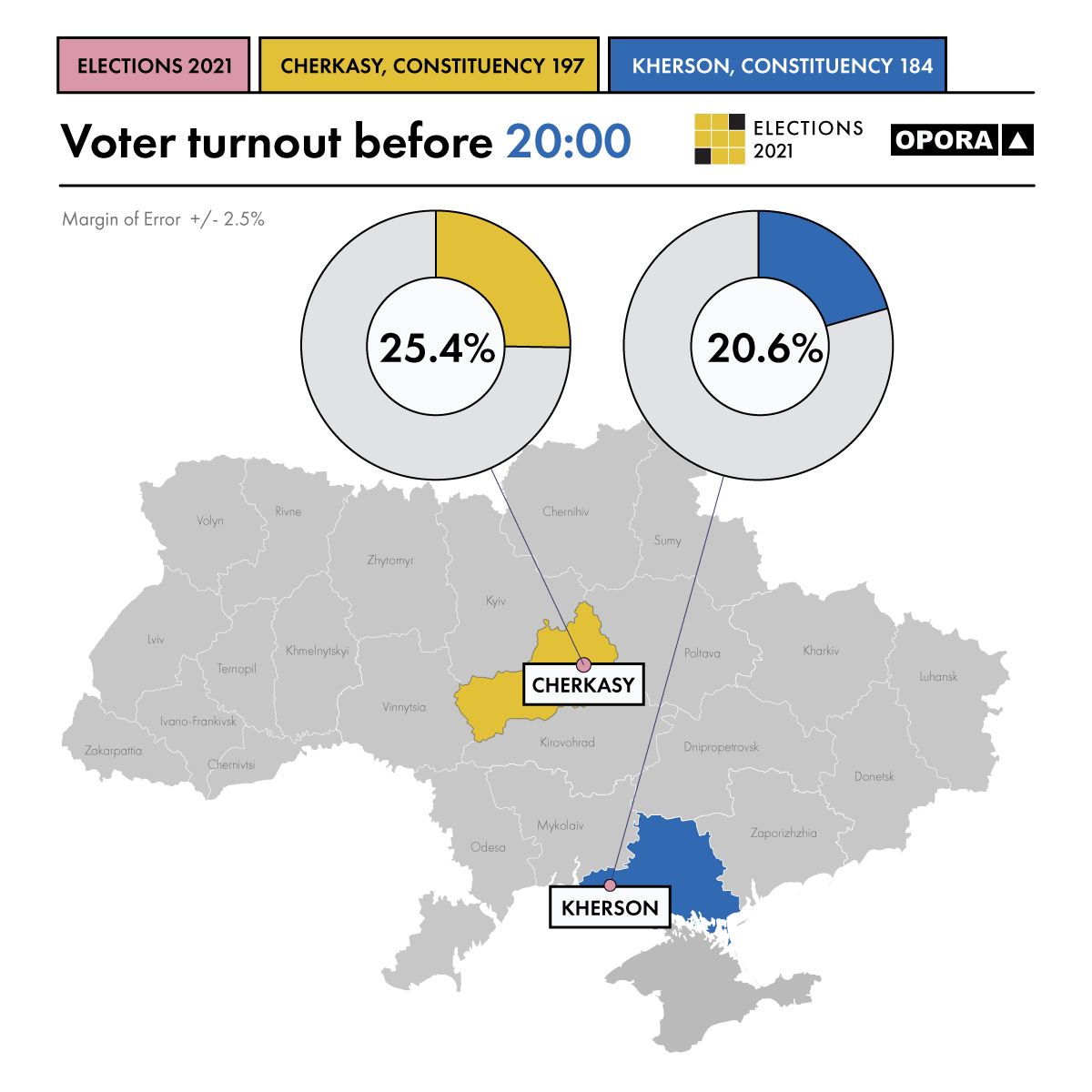
Results of Parallel Vote Tabulation
Extraordinary Elections of the Kharkiv Mayor
Based on a statistically sound sample, OPORA conducted observations throughout the voting day at 220 polling stations in Kharkiv city. Following the observation and data from 99% of these polling stations, the following results of parallel vote tabulation were obtained.
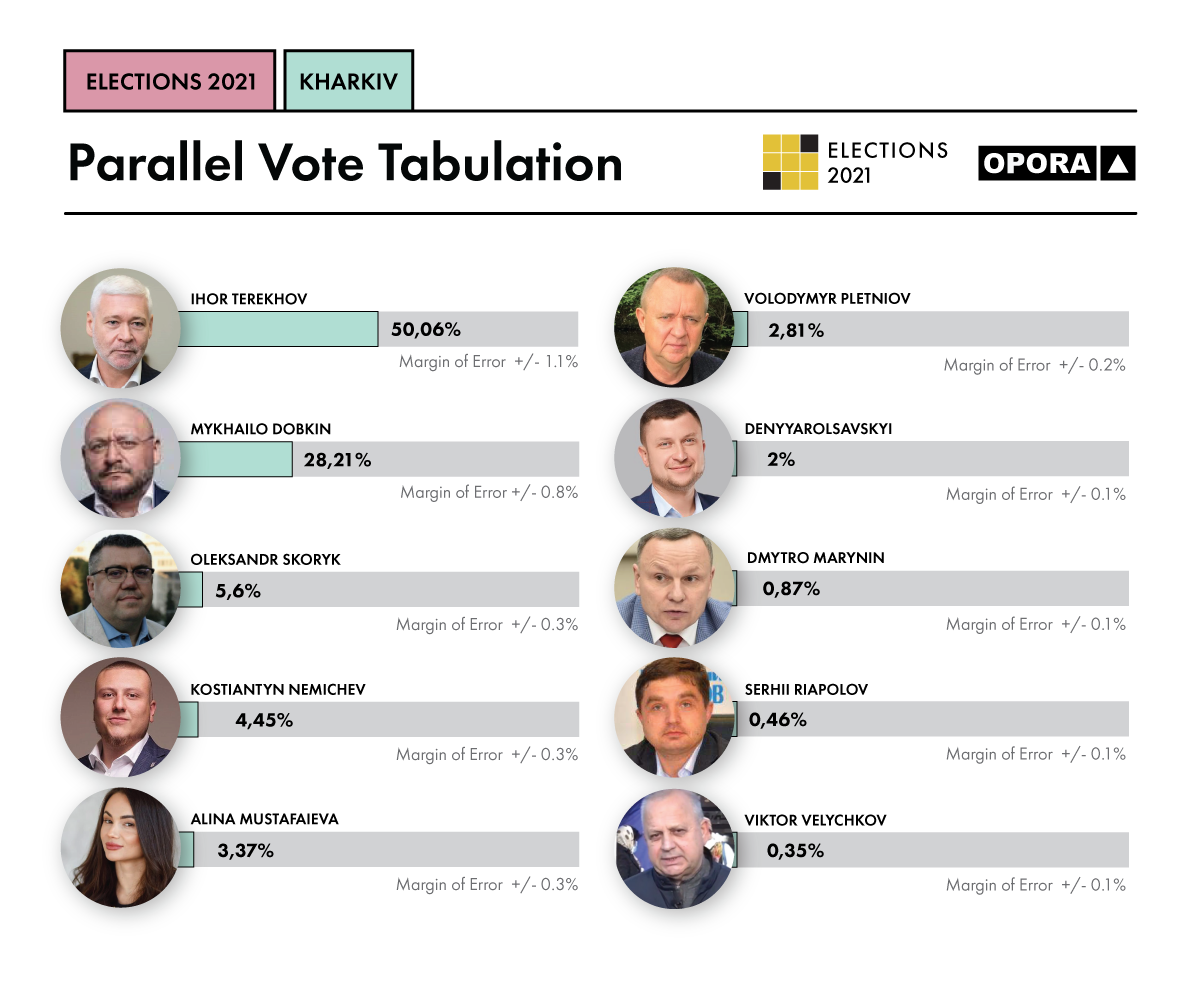
OPORA conducted observations throughout the voting day at 140 polling stations, out of 141, in constituency No.197 (Zolotonosha, Cherkasy region). Based on the data from these polling stations, the following results of the parallel vote tabulation were obtained.
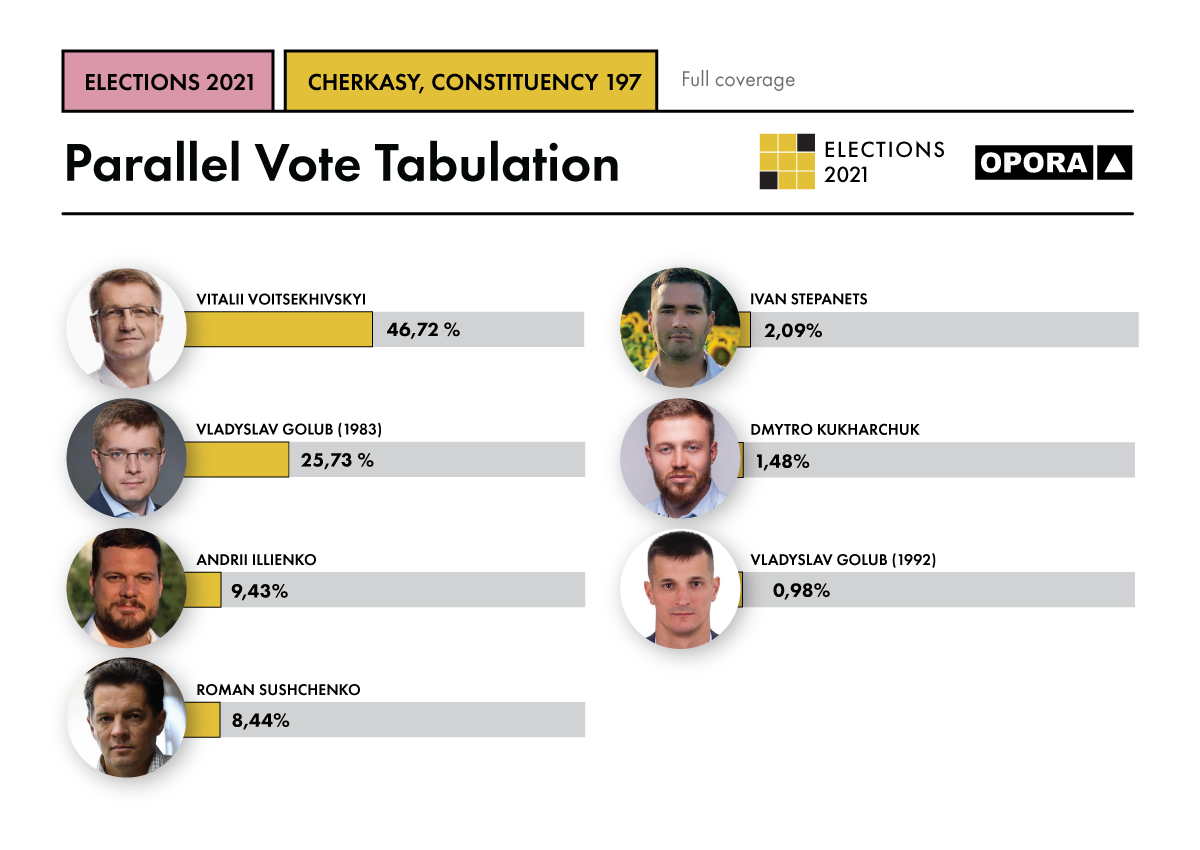
As part of the parallel vote tabulation (PVT), observers assessed the quality of the process and recorded official results based on PEC protocols; they did not poll voters on the results of their voting. PVT is conducted independently by the Civil Network OPORA, in order to receive unbiased information about the accuracy of official results of voting, no matter who wins.
RECOMMENDATIONS
To the Verkhovna Rada of Ukraine
- Ensure an inclusive parliamentary debate on improving the Electoral Code based on the experience of the current and previous elections.
To the National Police of Ukraine
- Promptly respond to violations of the law during the establishment of the returns and results of voting in the by-elections of people’s deputies of Ukraine, in the extraordinary elections of the Kharkiv mayor.
- Take all necessary measures to properly investigate recorded incidents of violations of election law.
To the Central Election Commission
- Ensure prompt informing of the public about the process of establishing the returns and results of voting.
- Promptly respond to identified problems of the election process at its final stage.
To the District and Territorial Election Commissions:
- Within the law, to study in detail all incidents of violation of the procedure of vote count and the voting process, and of obstruction to the activities of official observers.
- Ensure that PEC election documentation is properly reviewed to prevent anti-epidemic violations or create an excessive burden on PEC members.
- Ensure strict control over the preservation of election documentation during the work of district and territorial election commissions.
